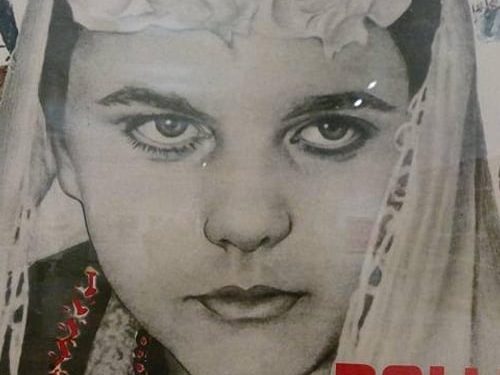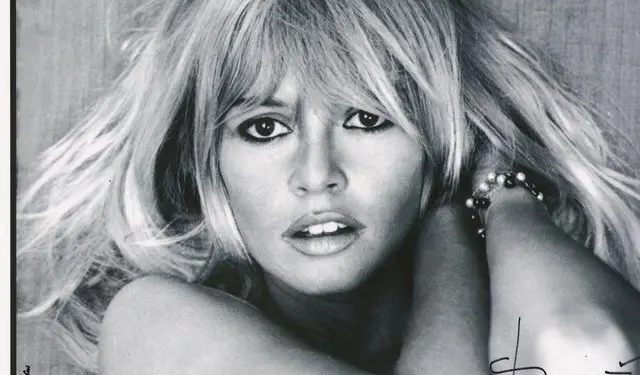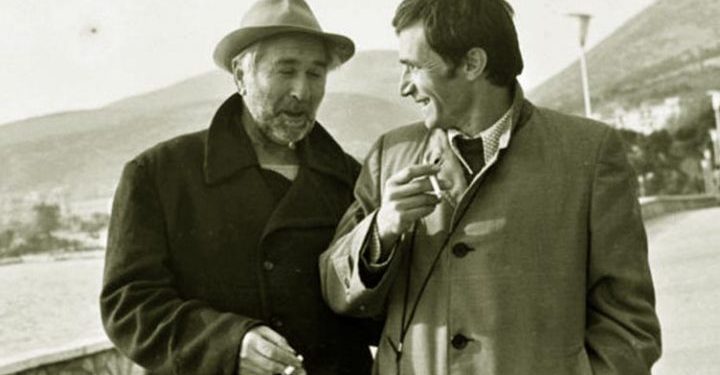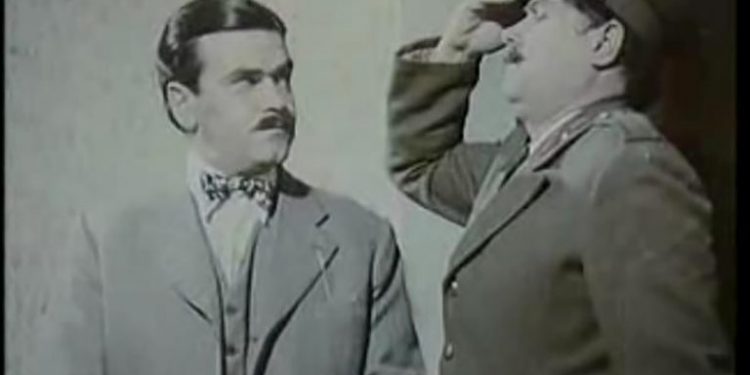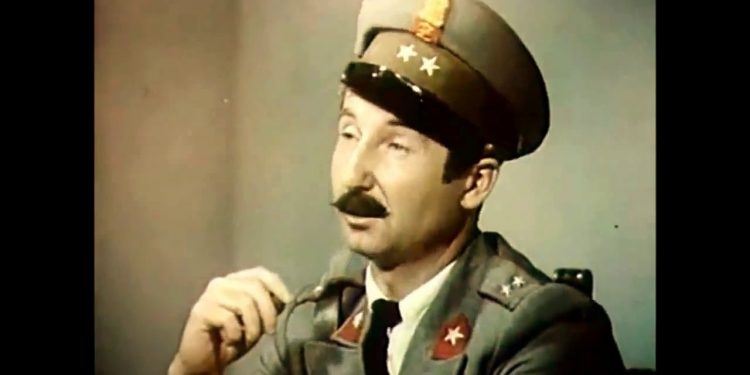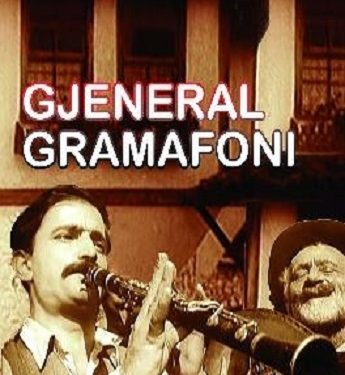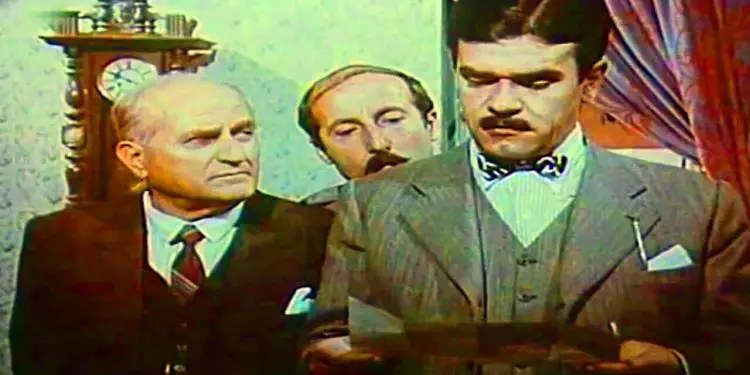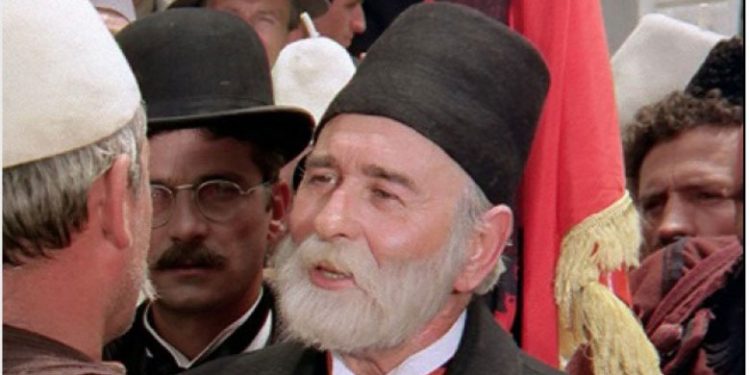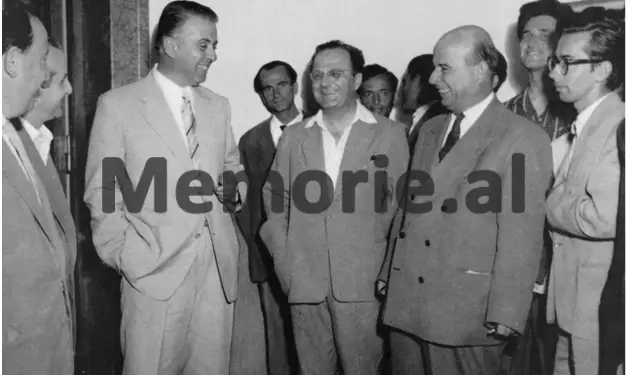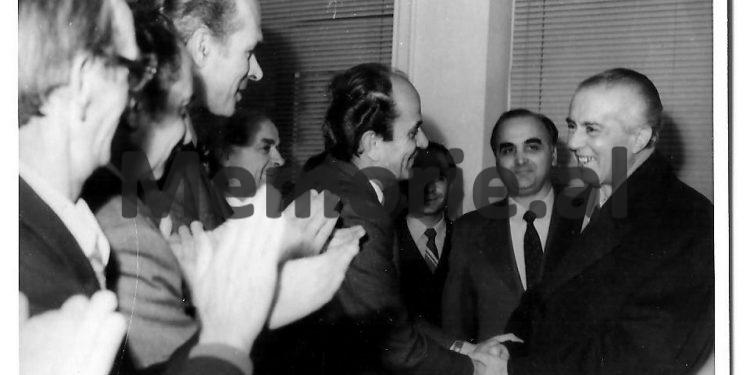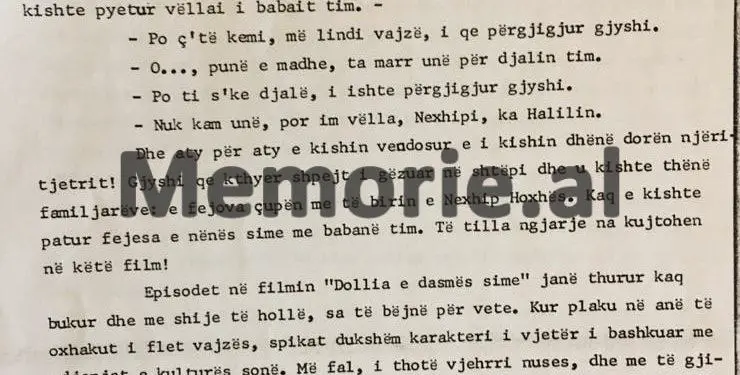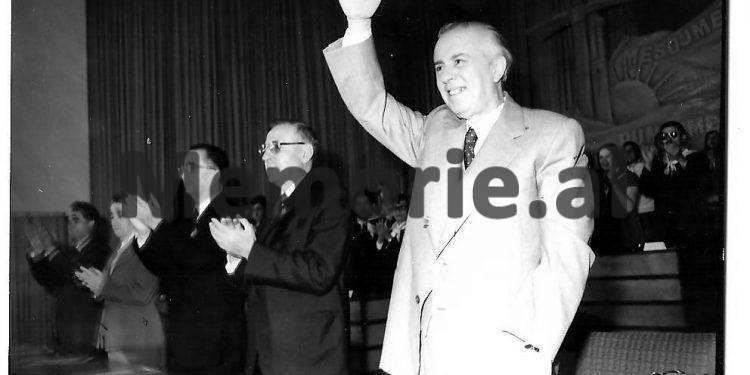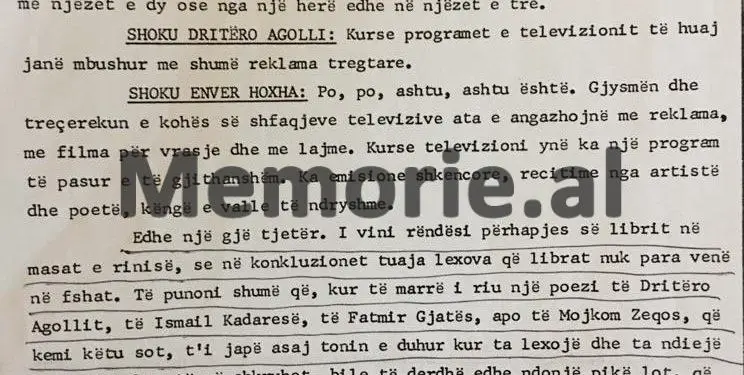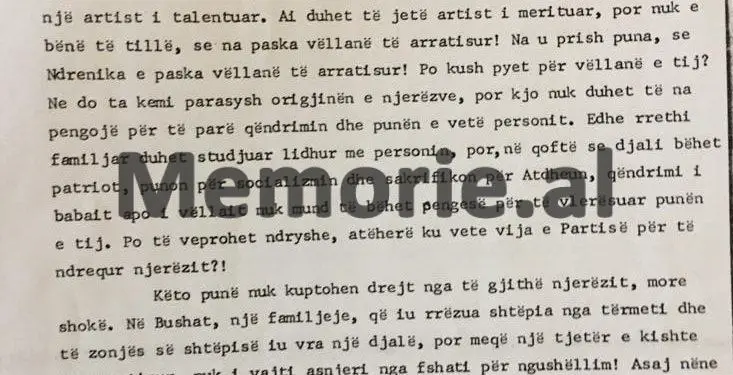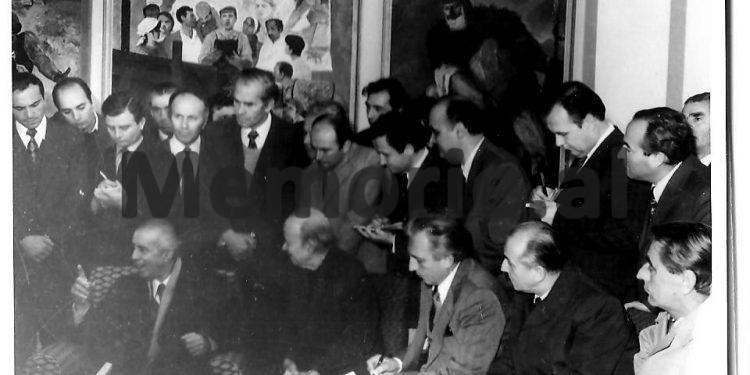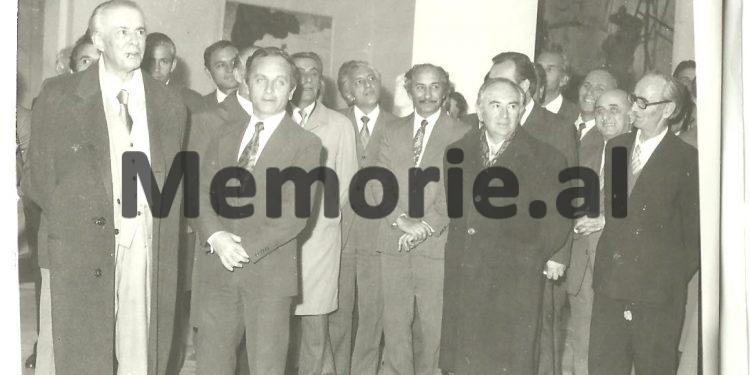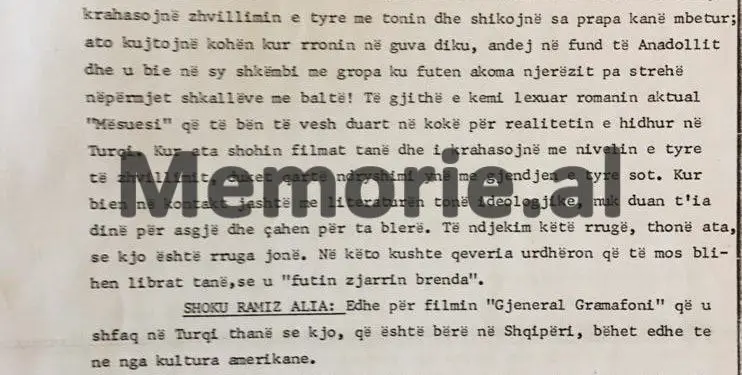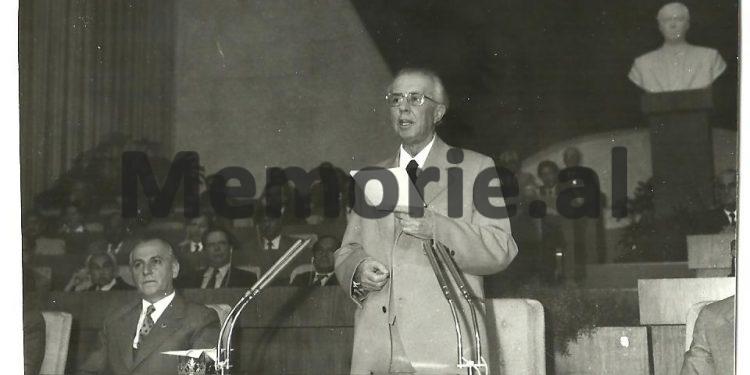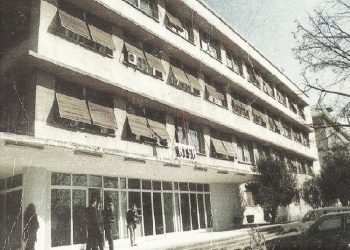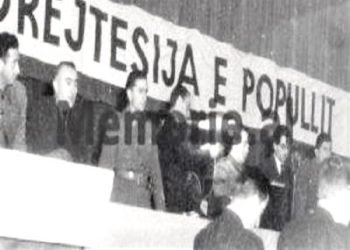Dashnor Kaloçi
Memorie.al publishes minutes of the meeting of the secretariat of the Central Committee of the ALP held in early 1979 where art and culture were discussed, a meeting chaired by Enver Hoxha himself, where in addition to the two secretaries of the Central Committee, Hysni Kapos, covering the organs of
The “Dictatorship of the Proletariat”, and Ramiz Alia, which covered art, culture, and propaganda, was attended by Xhelil Gjoni, Secretary of the Party Committee of the Tirana District, Vito Kapo, Minister of Light and Food Industry, Lumturi Rexha, Secretary the first of the Central Committee of the Union of Women of Albania, etc … In that meeting were also invited the President of the League of Writers and Artists of Albania, Dritëro Agolli, as well as the famous poet, researcher, and writer, Mojkom Zeqo. All the discussions held in that meeting where Enver Hoxha spoke a lot about art and culture, focusing on Albanian and world theater and cinematography, where among other things he spoke and appreciated a lot, the young actress Majlinda Gjodede who played the role the main character of the movie “My Wedding Doll” (written by Rruzhdi Pulaha and directed by Mark Topallaj), comparing him with the famous French actress, Bridget Bardo, as well as the beautiful play of other Albanian actors, such as Sander Prosi, Robert Ndrenika, Mirush Kabashi, etc.
(This article is taken from the book “Kadare in the documents of the‘ Palace of Dreams ”by Dashnor Kaloçi, (published by UETPRESS, Tirana 2017) and published with some abbreviations, giving more those parts of the document where it is about cinematography)
The document we are publishing in this part of the book is a minute of a meeting of the secretariat of the Central Committee of the ALP of 1979, which was chaired by Enver Hoxha himself, where among other items on the agenda, is also discussed the problems of art and culture, as well as youth in general. Based on this, Lumturi Rexha, the first secretary of the Albanian Youth Labor Union, Dritëro Agolli, as the President of the League of Writers and Artists of Albania, Mojkom Zeqo, poet, researcher, writer, etc. As can be seen from the minutes that we are publishing in full in this part of the book, the tone of the meeting was given by Enver Hoxha himself, wherefrom the invited guests, Mojkom Zeqo and Dritëro Agolli discussed less. What is noticeable there at that meeting is the fact that there has been a lot of talk and discussion about the problems of art and culture, or more precisely Enver Hoxha himself seems to have wanted to show his erudition and has “channeled” the topic of conversation in academic discussions and debates, such as p. sh .: the origin of Albanians, Pelasgians, Illyrians, Albanian language, culture, customary traditions, clothing, jubilee, Albanian and foreign cinematography, personalities of culture and art such as; Faik Konica, Namik Resuli, Sami Frashëri, Ismail Kadare, Fatmir Gjata, etc., etc., to filmmakers, and actors of the Albanian theater and cinematography of recent years, such as Rruzhdi Pulaha, Sander Prosi, Robert Ndrenika, Mirush Kabashi, Yllka Mujo, etc., highlighting the “superiority” of Albanian cinematography over foreign, mainly Turkish. Without wanting to dwell on the topic and level of discussions that took place at that meeting, what stands out is the absence of the writer Ismail Kadare, who at that time, not only was a member of the Academy of Sciences of Albania, ( with the academic title), but he was the author of a number of books and studies on what was discussed there. While it is not known exactly why Kadare was not invited there, the appreciation for him as a writer has not been lacking, even Enver Hoxha himself has expressed his superlatives, which is clearly seen in this document.
Meeting of the Secretariat of the Central Committee of the ALP
COMRADE XHELIL GJONI: Before we entered the secretariat meeting, we were in tension, but now from this conversation that took place here in this way we completely forgot the emotion.
COMRADE ENVER HOXHA: Perhaps this is how the meeting should be conducted. If I have a flaw that I am waiting for you, tell me.
COMRADE RAMIZ ALIA: This is how the youth will hold their meetings.
COMRADE MOJKOM ZEQO: To be honest, Comrade Enver, I couldn’t sleep last night.
COMRADE ENVER HOXHA: You couldn’t sleep, because you thought you would be in the secretariat tomorrow, what would I say there? How will my friends Hysni, Ramiz, Enver, and all the other friends listen to me?
SHOQJA LUMTURI REXHA: This is the wish to meet with the comrades of the secretariat of the K. Q. of the Party.
COMRADE ENVER HOXHA: We do not judge people only by the words they say in meetings, but we value them as a whole, seeing all their work, all their work, their past, present, and future. You who are of the pen can find errors in our phrases, but in free conversations we do not look at the phrases.
COMRADE DRITËRO AGOLLI: We also have a pan full of water in our writings.
COMRADE ENVER HOXHA: I also told my friends what I am telling you. I went to Gjirokastra once for the national independence holiday and gave a speech at dinner. Old teacher and patriot Thoma Papapanoja was also present. After I gave the speech, I saw Thoman, for whom I have always had respect, and I approached him, that the man himself on the mountain, not the mountain to the man: How can I have you, more basho Thoma, I pierced him and put my hand on his neck. Ehh, let’s just say I’ve seen better. Tell me the right as a teacher students.
As for my thoughts, I have nothing to say to you, Thomai replied, they were all good, and for grammar I am giving you a grade of seven. (laughter). To soften his stance, he added that it was clear that he had spoken without a card. Without a card, I told him, but I confused the dative nominative case, and instead of saying, we said “us.”
If we go into the rules of spelling, we have to say that we make a lot of mistakes in this area, but thankfully we have help from new friends who have been put to work and are correcting our writing. Possession of spelling, language, and punctuation is important. Many French writers, even Aragon among them, at one time erased the punctuation marks from their writings.
COMRADE ENVER HOXHA: Very well, very well. Well, we had a free conversation, from which we are coming out with a little deeper knowledge. We have not been strangers to this issue, because now especially, with the great development of folk art, folk dance songs, their fair effort, literature, arts, music, cinematography, our theater, etc. The food of all the people is being made every day. As Dritëro Agolli said, we must be fully convinced that what the Party did to prevent literature, poetry, and foreign films from flooding in our country in the way Fadil Paçrami, Todi Lubonja or the West wanted, was right. By doing so, we have not done a sectarian job, but a saving one. As much as we have been able to, why our translation forces have not been so great, we have also translated for readers’ works of classics of world literature. I say we have translated a little because even more could be chosen between them. Of course, it is bourgeois literature, but there are some things in it that help our people in the new socialist society to understand the development of worldview in bourgeois society.
Thus our people see the inferiority of bourgeois culture over our socialist culture. Marx did not say in vain that “I keep Balzac under my pillow.” Balzac wrote his Ruajalist views on the fight against the bourgeoisie and made him snobbish, stripping him completely naked. Marx said that he kept Balzac in his head, because in his works the struggle against the bourgeoisie, against capitalism and the decay of this bourgeoisie is reflected.
To go with the mind of Namik Resuli, who I mentioned a little while ago, who said that Faik Konica could not stand the views of Sami Frashëri, Jani Vreto, and Naun Veqilharxhë, is treason. He defended Konica, saying that Western culture was a more advanced culture. He, in defense of this thesis, cites Verlen, who was a homosexual element. In Verleni’s form, he has beautiful poems, but within his poems there are evil ideas. Namik Resuli also quotes Rembona, who was Verlaine’s boyfriend, who is a dark Brussels coffee shot with a cobweb and then got up and went to Africa, where he died. He mentions the culture of Baudelaire, known as the man of cafes, opium, and evil girls. His masterpiece is “Flowers of Evil”. This was their “culture”, which we could not allow to enter our country, to tarnish this pure youth that the Party has educated. No, we will not allow this.
When I have free time, I read French books, so I read political books, but from time to time I also pick up novels and poetry. I speak to you as a Marxist that they are not read. You can’t read more than 20 pages from them. You can’t even compare those books with the works of the classics, not even those of the 19th-century bourgeoisie. When you read, for example, a bourgeois book of the past, you see the character of the workers, the peasants, the strikes, and others.
And the current publications of the bourgeoisie are terrible. This does not mean that there are no novels and poems that can be read between them. I am talking about French literature and not about others, which are also more or less in those waters. Therefore, we have not done anything wrong with restricting foreign literature in this regard. We cannot feed the people with poisons.
Unfortunately, we also brought movies from abroad. We know all the reasons for this action, but before that, we did not have competent people, nor the means to produce films ourselves. Yet these films do not spoil the conscience and artistic tastes of the masses, that Party propaganda has done its job, it is deep and strong in our people, who maintain strong character, honesty, manliness, sense of justice and of hatred against murder, corruption, and evils. Our people watched foreign movies enough to pass the time. Our party gave a boost to the development of cinematography in time, with which we should be satisfied. We should be pleased that we currently have a dough formed in all sectors, for which we are constantly working to build socialism and protect the homeland.
The development of folk song and dance, for some time, had still remained at an unorganized level. The songs have been preserved by the people generation after generation and people, gathered head to head, constantly singing, but ahead, the level of the concerts left much to be desired. It’s completely different now.
The severe earthquake of April 15 this year raised the whole nation to its feet. The heroism of our employees to cope with the consequences of the earthquake will inspire our writers and artists to make poetry, novels, paintings, musical pieces, etc. When you hear people talking in a language that amazes you, you can’t help but be inspired. That is why the Party advises us to go to the people because in its bosom is the great well that feeds the people. The people have the great wealth of our language, of our expressions, of our best thoughts. It clearly shows courage, boldness, and deep wisdom.
Let no one is fooled by the successes at work as he says: I am wise. No matter how smart a man is, he can never be smarter than the people. In contact with the people there is everything a scholar needs. The ability of each of us is evident in the synthesis he makes of the knowledge of the masses with the sound Marxist-Leninist worldview. The sound worldview and the militant character that creates a work, of any nature, leaves an impression on future generations when it reflects the spirit of the people. Those deeds, which have their foundations in the sole of the people, are never repaid.
Many literary and artistic works published by various institutions are known in world history. Millions of books have been written in all languages, but most of them have been taken by the stream of time. The sludge is gone and only the cream is left. Numerous centuries have passed since Homer, but they have not erased his work because they reflect the historical epoch of antiquity. One of the directions of our development artistic ideas, which you did not mention here, is, for example, cinematography. I think, without being chauvinistic, it can be said that our cinematography has made a great qualitative leap forward; our films, which we are currently watching, are rarely found outside. The feelings expressed in them, their beautiful interpretation, warm and healthy environment, inspire with realism not only our people but, as Dritëro Agolli said, also foreigners who love us the best. Our films realistically show our lives, our past, our perspective, and our aspirations. If our films are not bought abroad, it proves that the bourgeoisie is afraid of their revolutionary content. We have information that the Turkish government has ordered not to buy Albanian films on the grounds that: we are set on fire inside. We also have information that at the film festival that took place in Istanbul, people were breaking down doors out of a great desire to see our films. We were not awarded the prize, because our feature films did not enter the competition. Only short films competed there.
We had seen the movie “My Wedding Doll” before, which was given at our film festival. He is of the genre that Dritëroi writes. Who made the script for that movie, Dritëro?
COMRADE DRITËRO AGOLLI: It was written by Ruzhdi Pulaha, who also wrote the comedy “Ladies from the City”.
COMRADE ENVER HOXHA: However, this scenario is of the genre of Dritëroi, who writes with realism and specifically for the villagers. You young poets, you must follow his example. What a beautiful film, made with emotion, it was for us. How beautifully the artist who is a young girl performed. Only with her eyes, without speaking at all, does she speak of what is difficult to express in words. Let them advertise as much as they want in France and all over the world to Brigitte Bardot, but our young artist of this film leaves it at the tail of the Bardona bridge.
The film touches on the customs of our people, the lives of our mothers who were engaged to their fathers in the cradle. There I also saw my mother’s life. One day my grandfather, my mother’s father, as I was told, was sitting in a cafe. What did you get Jonuz, why are you so noticed? – My father’s brother asked him. – What do I have, my daughter was born, my grandfather replied.
-Oh, great job, I’ll take it for my son.
“But you don’t have a son,” replied the grandfather.
-I don’t have it, but my brother, Nexhipi, has Halil.
And there they placed it and shook hands with each other. The grandfather quickly returned home happy and told his family: I got engaged to the maid with Nexhip Hoxha’s son. That was my mother’s engagement to my father. Such events are remembered in this film.
Episodes in the movie “My Wedding Doll” are woven so beautifully and with exquisite taste, that they make for themselves. When the old man on the chimney speaks to the girl, the old character, united with the feelings of our culture, stands out. Forgive me, says the father-in-law to the bride, and with all those gestures he appears strict about something, but also loving, progressive, and patriotic about the big things. This seems natural when he says, “Come on, girl, I’m bandaging my wounds.”
Or in the movie “General Gramofoni” it is the story that we have lived ourselves. the music of this film is chosen from those sweet melodies that our mothers sang to us in the cradle. Our shocking song accompanies the political action on foot and emerges victorious. It crushes the enemy, as the brave crushed it with guns in hand. Our song, with its popular echo, is a tribute to war.
In bourgeois society, we don’t necessarily like our films. The bourgeoisie does not like, that our proletarian morality is contrary to the degenerate bourgeois morality. However, even in this society, there are many people who do not tolerate the degeneration of their sons and daughters, the bourgeoisie’s calls for “sexual freedom”. Peoples are enemies of degeneration, and exploiting classes feed it.
Why do Turkish filmmakers love our films? They love to see how we have gone from darkness to light. They see a film that presents the situation 40 years ago in Albania, then another film presents the period of construction of socialism. Measures in Turkey compare their development to the tone and look at how far behind they are; they remember the time when they lived in caves somewhere, at the end of Anatolia, and they noticed a rocky pit where homeless people still enter through muddy schools. We have all read the current novel “Teacher” that makes you put your hands on your head for the bitter reality in Turkey. When they see our films and compare them to their level of development, it is clear our difference with their situation today. When they come in contact with our ideological literature, they don’t want to know anything about it and break up to buy it. Let’s follow this path, they say, that this is our path. Under these conditions, the government orders not to buy our books, because they “put fire inside them”.
COMRADE RAMIZ ALIA: Even for the film “General Gramafoni” that was shown in Turkey, they said that this, which was done in Albania, is done to us by American culture.
COMRADE ENVER HOXHA: Yes, American culture penetrates Turkey, because in capitalism the strongest state exports the lifestyle of the weakest states. The way of life is not only the purchase of drugs, nylon, costumes, or shoes but also the foreign culture that corrupts the masses through their purchase.
Our actors, young and old, professionals and amateurs, are great because they have come out of the bosom of the people and the Party has educated them. When you watch Sander Prosin in the TV movie The Path of Letters, playing the role of Dhaskal Todor, everyone lived with the efforts and sacrifices of our great scholars, who sacrificed their lives.
That film really represents the great strength of our people, the ability and self-sacrifice of our people. When we watch such movies, our people say: ‘more, in these times the other one would kill you for nothing and look for dog fat, as Dhaskal Todri was killed for the letters of the Albanian language. I had a reaction to putting the knife behind my back and why? Because you loved your language.
The same impressions of the bitter past, of the intrigues of the exploiting classes, are created for the spectators even when they watch the concert of Tefta Tashko and others. Robert Ndrenika, who masterfully interprets the role of deputy prefect in the film “Concert in 1936”, is a talented artist. He must be a deserving artist, but they did not make him such that we had a runaway brother. We lost our job because Ndrenika had a runaway brother. But who asks about his brother. We will consider the origin of people, but that should not stop us from seeing a person’s attitude and work. The family circle should also be studied about the person, but if the son becomes a patriot, works for socialism and sacrifices for the homeland, the attitude of the father or brother cannot become an obstacle to evaluating his work. If done differently, then where is the Party line itself to correct people?
These jobs are not properly understood by all people, more friends. In Bushat, a family whose house was destroyed by the earthquake and the lady of the house were killed by a boy, but since another had escaped, none of the villagers went to comfort him. She is survived by two other sons, such as the diva, but no one spoke to them verbally. What is this attitude? If that old woman has a runaway son, she is a citizen. And when the party secretary went to comfort them, the silent, astonished old woman said to him, ‘You, you took me home? How is that possible? I will come, said the secretary, to the one who betrayed the homeland, to the devil. Take what belongs to us, and the house will be repaired by the state. Now the two old boys work enthusiastically and warmly day and night.
You are young, but we, the elderly, remember Lushja before the liberation, just like in the movie. The one who played the role of gendarmerie commander, as my son-in-law told me, is a friend of his, played that role well.
We are moving forward in cinematic art, which we need to help develop even more. Even young artists, we have them well and with perspective. They have starred in new films such as “Girls with Red Ribbons”, “Poppies on the Walls” and so on. In these films, even the youngest ones play, but they perform so beautifully that you are surprised to see them.
Even our television has taken a good path. It is not easy to fill the television with shows from eighteen to twenty-two, or once even twenty-three.
COMRADE DRITËRO AGOLLI: And foreign television programs are full of commercials.
COMRADE ENVER HOXHA: Yes, yes, it is. They engage half and three-quarters of the time on television shows with commercials, movies about murder, and news. Our television, on the other hand, has a rich and comprehensive program. There are scientific shows, recitations by artists and poets, various songs and dances.
One more thing. Pay attention to the spread of the book among the youth, because in your conclusions I read that books do not come before, in bandages. Work hard so that when the young person receives a poem by Dritëro Agolli, Ismail Kadare, Fatmir Gjata, or Mojkom Zeqo, which we have here today, give it the right tone when you read it and feel spiritual what it is written, even shed some tears, so that others can open their eyes and say: where is this book for us to take and read. These forms of work often have more of an effect than a conference.
It seems to me that I have talked a lot about these issues, so let’s end them and wish you success at work. Give us as many good deeds as possible from your creativity and work to make them use the masses of youth.
Good. We’re done. Let me once again lend a hand to you, your friends, and your youth. Be well and goodbye./ Memorie.al





